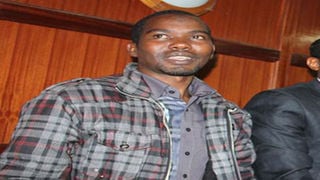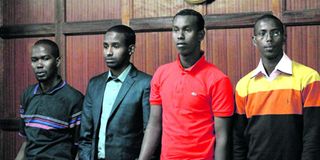
Hussein Mustafa.
| File | Nation Media GroupNews
Premium
Mustafa: the terrorists’ loyal tailor
Hussein Mustafa had arrived in Eastleigh with a sewing machine. His customers, at a rented stall in the Eastleigh Shopping Centre, thought he was a tailor struggling to eke out a living. But he was on a mission.
Mustafa’s sewing machine masked his intentions. Every morning, mostly without fail, he would open the stall and take orders – like any tailor would. But he was in Eastleigh for a purpose: an evil assignment that culminated in the 18-year sentence he is now serving for assisting the Westgate terrorists.
As the terrorist’s tailor, Mustafa was to design and make the grenade and magazine vest jackets that were to be used by the terrorists on the day of the attack. He was to make sure the jackets could hold grenades and enough magazines to sustain a lengthy siege.
It is not clear when Mustafa was recruited into the Westgate plot, but shortly after the Directorate of Criminal Investigation (DCI) detectives followed the trail of phone records as the siege was going on, they knocked on his door in Eastleigh. He was gone.
Luckily, he had not switched off his phone and he could be seen fleeing towards Dadaab refugee complex, according to the detectives who finally traced him. He had sold his sewing machine and was traced to a shop in Hagadera camp, one of the three that make up Dadaab.
“To get these masterminds required a lot of effort. It was a dangerous assignment,” says Mr George Kinoti, the DCI boss.

Hussein Mustafa (left) in court on January 14, 2019. With him are Adan Dheq, Kiban Abdalla and Mohammed Abdi.
The others are Dagahaley and Ifo in Lagdera. Hagadera is in the neighbouring Fafi constituency. Most of the refugees here arrived in 1990s and have families raised in the camps that resemble naturally-grown commercial hubs.
It also has many al-Shabaab sympathisers and terrorists lurking in the settlements.
Call logs indicated that Mustafa had called Abdinur -- the perceived leader of the terrorists who died at Westgate -- 26 times between July 27 and August 14, 2013, on his cell phone. When caught in Hagadera Block J10, he told DCI detectives that he was calling Abdinur to demand his pending payment. But that was not the only person he called, as it emerged later.
Mustafa was also in contact with the first accused, Mohammed Abdi, at least 37 times between August 1, 2013 and September 29, 2013, and also sent WhatsApp messages to Dhuhulow, the Somali-Norwegian attacker, up to the day of the attack.
Somali-Norwegian terrorist, Ali Hassan Afrah Dhuhulow.
That was before he closed his shop, sold his sewing machine and escaped to Dadaab. He was arrested on October 14 and is now serving 18 years in jail.





